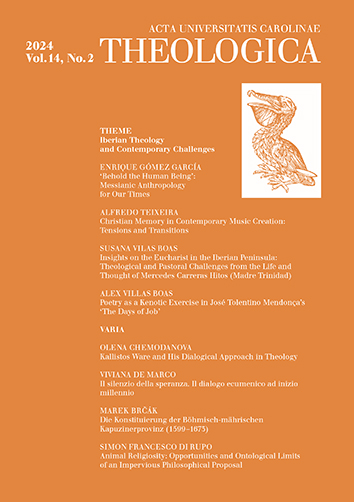AUC Theologica is a peer-reviewed journal for theology published twice a year. As we publish original papers in English, German, French, and Italian, our mission is to serve as a platform both for Czech researchers, who can present their research results in these languages, and for international contributors, who are invited to enter the academic theological discussion in the heart of Europe.
The journal focuses on a wide range of theological disciplines, such as systematic theology, biblical studies, patristic studies, pastoral and spiritual theology, religious education, church history, etc. Within these fields, the journal seeks to reflect the current theological questions and problems, which often requires interdisciplinary approaches. Supporting the intersection of various theological disciplines, we thus also welcome theological papers touching other academic fields including philosophy, sociology, literary studies, and science.
Each issue consists of two sections. The thematic section presents papers of the same focus. The section called ‘Varia’ invites papers dealing with various theological themes from the perspective of all Christian traditions. Our current and past issues are approachable for free on this website in the form of Open Access.
AUC THEOLOGICA, Vol 6 No 1 (2016), 197–212
Faithful obligations: Merold Westphal’s middle class liberation theology
Justin Sands
DOI: https://doi.org/10.14712/23363398.2016.10
published online: 01. 07. 2016
abstract
Often, liberation theology’s preferential option for the poor is pushed aside within theological discourses as being too specific, too focused on social problems, to function as a viable theology for the Church as a whole. Through this line of reasoning, many often see liberation theology as something that can remind Christians of their need to help others, but it cannot become the foundation for a sustainable belief system. In response to this, I claim that a liberation theology can be viable for daily life of all persons and this article explores this argument through the work of Merold Westphal, who’s philosophical theology founds a style of liberation theology that is directed at the middle class – in his context the American middle class. This article explores the ways in which liberation theology can work as a general, programmatic theology for all within the Church, which not only empowers those at the margins but society as a whole.
keywords: Liberation Theology; Philosophical Theology; Fundamental Theology

Faithful obligations: Merold Westphal’s middle class liberation theology is licensed under a Creative Commons Attribution 4.0 International License.
148 x 210 mm
periodicity: 2 x per year
print price: 100 czk
ISSN: 1804-5588
E-ISSN: 2336-3398
